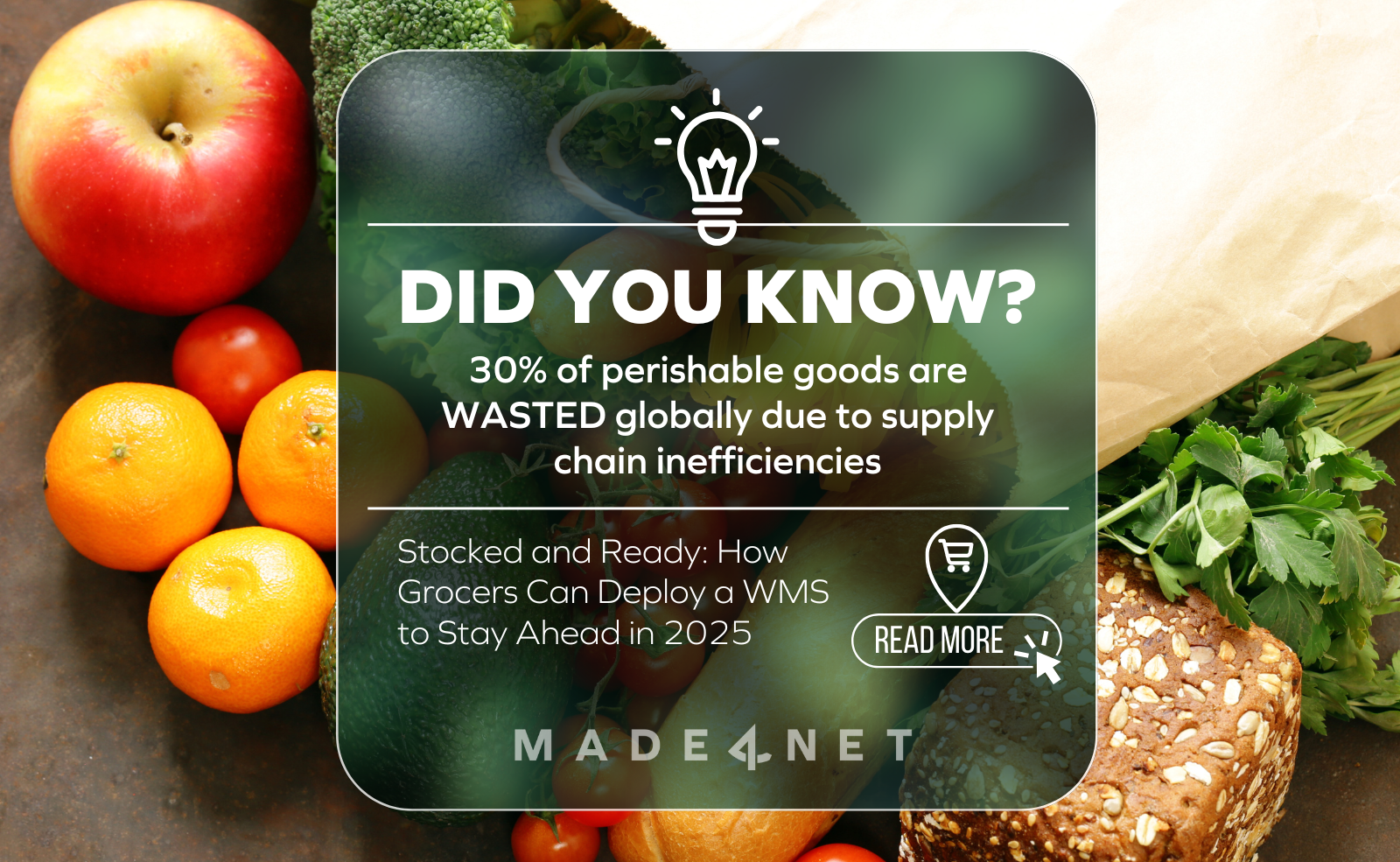
Did you know that nearly 30% of perishable goods are wasted globally due to supply chain inefficiencies? At the National Grocer’s Association Show, happening February 23-25, 2025, we’ll be sharing proven tactics to overcome these challenges and much more. To get you started, we’ve created a WMS selection toolkit packed with actionable insights.
Discover how one technology upgrade can transform your food distribution operations. Learn what’s fresh and what’s next, and don’t forget to visit us during the show at Booth 2309. See you there!
- Food and Beverage Distribution
- Inventory Tracking & Control
- Transportation Planning
- Regulatory Compliance
- Integrated Voice Picking
- Smart Record Keeping
- Digital Integration
- NGA Show
Food and Beverage Distribution
Keeping food products safe requires organization, speed, and a robust food and beverage warehouse management system (WMS). As standards and regulations for perishable foods and fresh food delivery continue to change, it is essential to implement a system that tracks expiration dates and rotates inventory to meet customer service-level agreements (SLAs). So, how can grocers stay ahead in 2025? They need a food and beverage WMS that moves products safely, efficiently, and quickly. They need a WMS with these 6 features:
Inventory Tracking & Control
Keeping accurate track of inventory in the food distribution space is vital for preventing overstocking, minimizing waste, and ensuring fresh products reach customers. Food distribution software like a WMS allows businesses to easily track inventory levels, monitor product rotation (FIFO/FEFO), and gain real-time visibility into stock. This is how operations make informed decisions about how a product travels through the supply chain to ensure it is fresh and safe.
End-to-end tracking and accountability are also critical for grocers to keep up with necessary regulatory compliance requirements and recalls, ensuring product safety, minimizing financial losses, maintaining consumer trust, and enabling quick action to address potential issues in the supply chain. Robust tracking systems can streamline reporting processes, reduce manual errors, and enhance overall operational efficiency.
Transportation Planning
Transportation plays a pivotal role in the food and beverage sector, where delays, spoilage, and lost revenue due to inefficiencies can significantly impact a grocer’s bottom line and reputation. To stay competitive and maintain customer trust, grocers must implement agile distribution operations capable of handling unexpected demand fluctuations. By leveraging dynamic routing and advanced transportation management systems, along with flexible inventory allocation rules, grocers can gain real-time visibility into inventory, optimize delivery routes, and respond swiftly to urgent needs—ensuring both operational continuity and enhanced customer satisfaction. This integrated approach not only minimizes risks but also maximizes efficiency, keeping products fresh and deliveries on time.
Customer Spotlight: Sprouts
Sprouts is tackling the challenges of managing produce, one of the most fragile commodities, with the help of Made4net’s WMS solution. By leveraging advanced tools for expiration date tracking, quality control measures, and rapid putaway, Sprouts is minimizing shrink and damage to their fresh goods. Made4net’s WMS solution ensures timely deliveries, optimizes inventory management, and helps maintain the high standards of freshness their customers expect—all while driving operational efficiency.
Regulatory Compliance
Perishable goods are protected through strict standards and regulations governing their storage, transportation, and delivery. This is why the FDA has a set of requirements designed to foster food safety. These requirements include hazard analysis, corrective and preventive measures, as well as various conditional elements that address specific risks related to food, its processing, and its storage. A robust WMS empowers grocers to remain compliant with the industry’s ever-evolving rules by ensuring proper temperature control, accurate tracking of expiration dates, and adherence to food safety protocols. These controls help grocers minimize the risk of spoilage, contamination, and regulatory violations.
Integrated Voice Picking
Integrated voice picking is a game-changer in the food and beverage sector, where speed, accuracy, and efficiency are critical. By enabling workers to receive real-time, hands-free instructions through voice commands, this technology reduces the risk of errors and increases picking speed. It allows operators to stay focused on their tasks without needing to stop and consult paper lists or handheld devices, streamlining workflows and enhancing productivity. In an industry where perishable goods and strict compliance regulations are key, integrated voice picking helps ensure faster, more accurate order fulfillment, improving both operational efficiency and customer satisfaction.
Customer Spotlight: Souto Foods
Souto Foods has nearly doubled their case picking rate per hour with Made4net’s WMS solution and voice picking technology. Initially aiming for 72 cases per hour, they are now averaging 120 cases per hour just 90 days after going live, with ongoing improvements still in progress.
Smart Record Keeping
Grocers face increasing pressure to maintain accurate, efficient, and compliant operations in their distribution centers, making smart record-keeping more critical than ever. A WMS enables robust, data-driven record-keeping that helps grocers ensure the integrity of their supply chains. By capturing and tracking comprehensive product data—from batch numbers to expiration dates—grocers can effectively monitor inventory, prevent spoilage, and reduce waste, minimizing the risk of compromised product quality or hazardous situations.
WMS solutions also provide real-time visibility into inventory, ensuring that stock levels are always up-to-date and enabling rapid responses to changes in demand or supply. With advanced data analytics, grocers can identify trends, forecast needs, and make more informed decisions about inventory allocation and reordering.
Digital Integration
Grocers need seamless digital integration with their WMS to thrive in today’s complex food distribution landscape. By connecting their WMS with third-party applications and enterprise systems, grocers can track and trace products effectively, manage expiration dates, and address unique location-specific requirements. Advanced features like temperature sensors monitor every step of the journey, ensuring product safety by mitigating risks from even minor fluctuations. With its ability to oversee intricate warehouse operations, optimize workflows, and provide real-time inventory tracking, a WMS becomes an essential tool for managing the painstaking details of food distribution.
Find Solutions at the NGA Show
With the right WMS, grocers like Sprouts, Souto Foods, Gelson’s, Fiesta, Crest, and GAMA have streamlined their operations, reduced waste, and stayed ahead of evolving regulations. Want to learn how they did it? Visit Made4net at the NGA Show, Booth 2309, from February 23-25, 2025. Let’s transform your grocery supply chain together!


